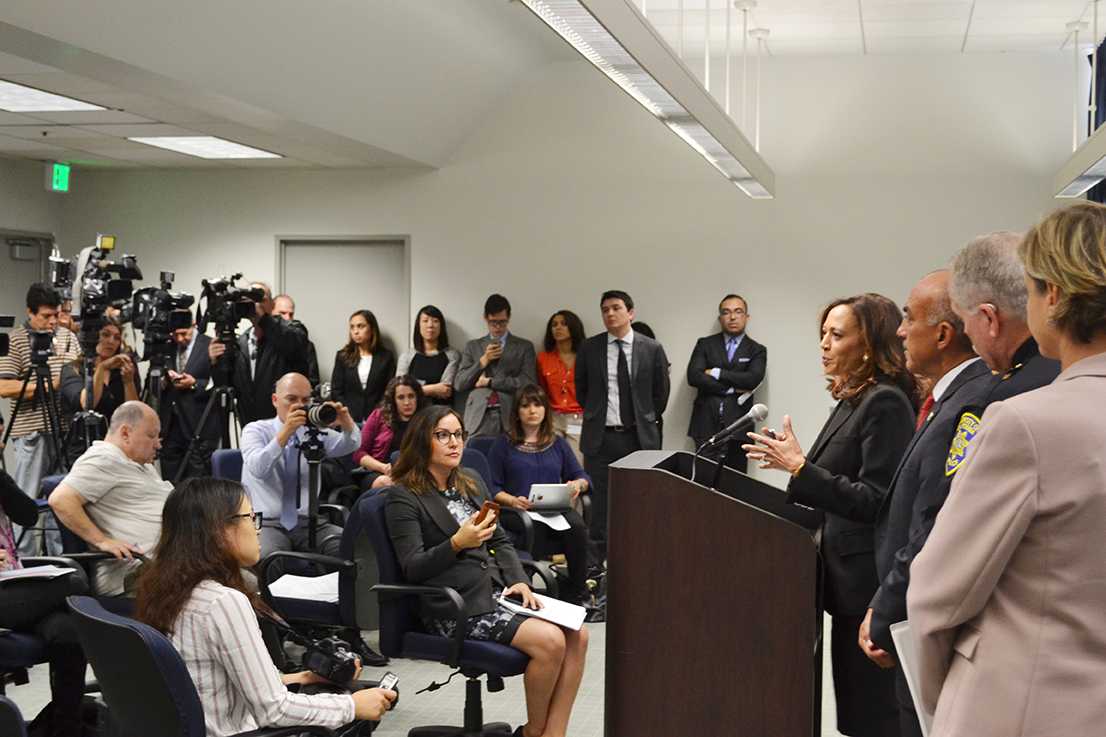The California Department of Justice, in conjunction with the University of California system, introduced a new model of cooperation on Wednesday between college campuses and local law enforcement when handling sexual assault cases.
Attorney General of California Kamala D. Harris said that the Model Memorandum of Understanding aimed to improve methods used by universities and law enforcement agencies when investigating cases of sexual assault.
Harris said that current data suggests that 80 percent of campus sexual assaults go unreported to law enforcement. Savannah Badalich, a survivor of a sexual assault and the founder of 7000 in Solidarity, a victim’s rights group at UCLA, said that there are many reasons why other survivors may not report their assault.
“For survivors who report, there’s two traumas that they experience: one is their experience of the sexual assault itself,” Badalich said. “And the other is having to relive that sexual assault — sometimes for months if you are going through the campus adjudication process, oftentimes for years if you are going through the criminal justice system.”
California State University, Long Beach Title IX Coordinator Larisa Hamada said that one of the effects of better coordination between campuses and law enforcement will be not having sexual assault victims to repeatedly recount their experience. She said that the Title IX office meets quarterly with campus police, medical professionals, the Long Beach Police Department and various advocacy groups to look for best practices when dealing with sexual assault.
“Right now we have excellent working relations with the local police,” Hamada said.
UC President Janet Napolitano, members of law enforcement and victim advocates joined Harris to announce the new model at a press conference in the California Attorney General’s Office in Los Angeles. Harris said they hope that the MOU would serve as a standard for colleges throughout the state and for the nation at large.
Key provisions from the MOU include clarifying the duties between campuses and law enforcement when responding to a case of sexual violence, ensuring the timely access of services for victims and providing training for the campuses and law enforcement.
Napolitano said that the UC system, which helped to create the MOU, would be adopting the agreement system-wide, but participation from other colleges in the state will be voluntary.
“CSU plans to use the Model MOU as a resource in evaluating whether to revise local coordination and collaboration agreements with other law enforcement agencies,” CSU Title IX Compliance Officer Pamela Thomason said via email.
The guidelines are also set up to ensure that all California universities and local and state law enforcement agencies comply with Assembly Bill No. 1433, which requires reports of violent crimes, sexual assault and hate crimes to be disclosed to the other parties within a timely manner.
Harris said that there are 11 California colleges and universities under Title IX investigations by the U.S. Department of Education. As of March 4, that includes UCLA, USC and UC Berkeley as well as 98 other postsecondary institutions across the country, according to a list published by the senior editor for higher education at The Huffington Post, Tyler Kingkade. That number is up from 55, according to the list issued by the Department of Education in May 2014.
Among the many issues that the MOU hopes to address is the jurisdiction for collecting and testing evidence in a timely manner. This includes the sexual assault forensics examination, commonly referred to as a rape kit.
“One very important aspect of this MOU…adherence to this MOU requires that law enforcement will collect and test rape kits,” Harris said. “We are not going to allow rape kits to sit on a shelf and gather dust.”




